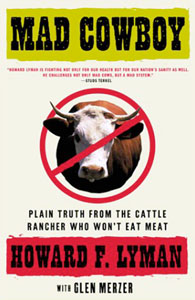![[Metroactive Books]](/gifs/books468.gif)
[ Books Index | North Bay | Metroactive Home | Archives ]
Meat and Greet
The 'Mad Cowboy' rides again
By Kimberly Arnold
It has been six years since Howard Lyman and Oprah Winfrey won the Texas lawsuit against them for slandering the meat industry. Appearing on Oprah's talk show, Lyman claimed that the industry's practice of grounding up the remains of dead cows and feeding them to live cows could cause the spread of mad cow disease across the United States. This method of forced cannibalism prompted Oprah to exclaim, "It has just stopped me cold from eating another burger." While this gruesome practice ended several years ago, Lyman's message has stood the test of time with an increasing number of converts and, like any true activist worth his salt, an increasing number of challengers.
His controversial statements, such as "meat kills. It kills us just as dead as tobacco kills us, but far more frequently," have brought out more than just the Texas cattlemen millionaires. At one time, there were five lawsuits pending against Lyman. But he continues to pound the pavement in defense of vegetarianism. As recently as March, Lyman was put to task on Bill Maher's talk show, Politically Incorrect, for his 1998 book Mad Cowboy: Plain Truth from the Cattle Rancher Who Won't Eat Meat (cowritten with playwright Glen Merzer).
On the show, outdoor enthusiast, hunter, author, and freelance journalist Humberto Fontova asserted that "we are omnivores. . . . Our stomachs secrete hydrochloric acid. No herbivore does this. The only reason it does that is to digest meat because our ancestors did it for three million years." Nonplussed, the cowboy from Montana shot back, "If you believe that, you're smoking the number one crop out of California."
Such dry wit belies the strong scientific basis for Lyman's argument against the consumption of meat. Mad Cowboy documents numerous studies that read like science fiction. For instance, his description of John Kurtz's FDA-monitored experiment of the recombinant bovine growth hormone (rBGH) used to increase milk production seems too bizarre to be real. In an act of willful ignorance, the chemical company that hired Kurtz refused to accept the boxes of data he shipped to them, the very conclusions they had gone to such expense to investigate. Infertility, a symptom called "downed cows" (cows who couldn't stand up due to drained calcium from their bones), and increased and accelerated death rates plagued rGBH-fed cows.
Lyman's compelling book cites other studies investigating the effects of meat consumption. The Council on Environmental Quality in 1975 revealed that 95 percent of the human intake of DDT came from meat and dairy products. His claims are further supported by a study done by The Journal of the American Medical Association from as early as 1961, which concluded that "a vegetarian diet can prevent 97 percent of our coronary occlusions."
Most vegetarians are familiar with standard arguments that people like Fontova pose: "The longest-lived people on Earth are carnivores. The shortest-lived people are the Hindu vegetarians. The Northern Indians eat nothing but meat. Not just meat, but blubber and organs. And they have a lower cancer rate." Lyman is quick to counter: "Totally wrong. You should learn to read before you start spreading all this stuff out. And they live to be 50 years old."
While longevity may not be a compelling enough reason for most people to give up their beloved beef, the gross-out element might be the deciding factor. Consider the effects of mad cow disease on the animals stricken by this merciless killer. Brain tissue develops holes, looking much like a sponge, which causes dementia in the cow and eventually kills it. In sheep, the disease is called "scrapie" due to the tendency of infected sheep to stagger around and scrape against things. In humans, this spongy-brain condition is referred to as Creutzfeldt-Jakob disease. People can contract Creutzfeldt-Jakob through the consumption of infected meat. As a fatal disease that is transmittable from species to species, this has truly frightening implications.
Lyman wasn't raised by left-wing liberals or idealistic vegetarians. He was a hard-working, fourth-generation dairy farmer and cattle rancher. It took a medical crisis--a spinal tumor almost paralyzed him--before he took pause and looked at what the chemicals he was using and the meat he was ingesting were doing to his body. His conversion to vegetarianism isn't just the story of one man's transformation; it is the story of a movement in the making. But don't be fooled. For all its innocence, Mad Cowboy could cause radical changes in your life that may revolutionize the culinary habits of not only your own world, but of the whole world.
[ North Bay | Metroactive Central | Archives ]
Copyright © Metro Publishing Inc. Maintained by Boulevards New Media.
![]()
 Bovine Compassion: Howard Lyman's 1998 book continues to make waves.
Bovine Compassion: Howard Lyman's 1998 book continues to make waves.
Howard Lyman appears at the Health Extravaganza on June 2, 3-6pm, at the Napa County Fairgrounds, Tubbs Bldg., 1435 N. Oak St., Calistoga. $10 donation. 707.978.3995.
From the May 30-June 5, 2002 issue of the North Bay Bohemian.